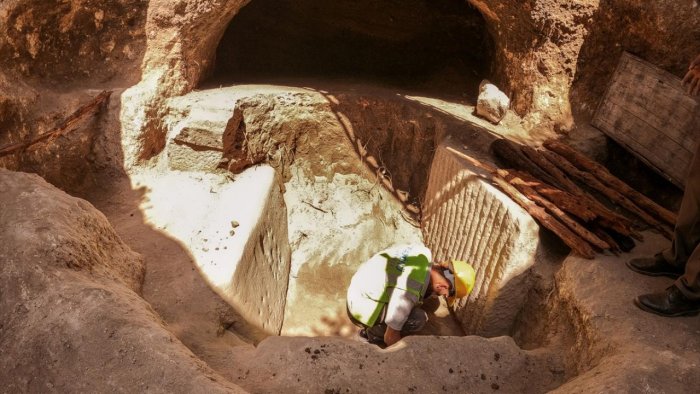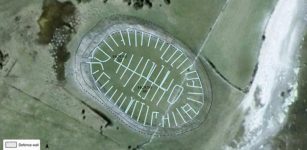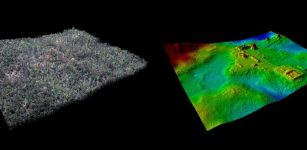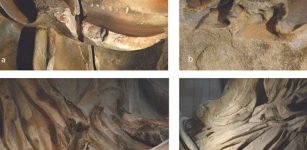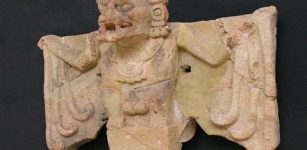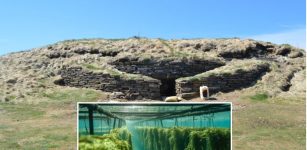Huge Ancient Sarayini Underground City Is Twice As Large As Previously Thought
Jan Bartek - AncientPages.com - Scientists knew the ancient underground city they examined was huge, but now it's obvious it's twice as large as previously thought! What secrets does this mysterious ancient place hide? How many underground tunnels, galleries, chambers, and unknown rooms still await discovery?
The ancient Sarayini underground city covers at least 20,000 square meters. Image credit: Anadolu Agency (AA)
The ancient underground city in Sarayönü, a district of Konya in Turkey, dates back to the Roman period. When first examined by archaeologists, it was thought the subterranean city covered an area of 5000 m2, but a recent investigation reveals this enigmatic ancient place is at least 20,000 square meters, if not even more!
In co-operation with the Ministry of Culture and Tourism and Sarayönü Municipality, scientists are investigating the ancient underground city for the second year. What has been discovered so far is fascinating. There are dozens of underground rooms connected to each other by tunnels of different lengths and widths. Many corridors, tunnels, and galleries are still waiting to be cleaned, so it is currently difficult to determine where they lead.
Is Sarayini Turkey's Largest Underground City In Horizontal Architecture?
The history of the subterranean place, which includes domestic spaces, connected galleries, room-like living spaces, water wells, furnaces, workshops, chimneys, oil lamps for lighting, cellars, warehouses, ventilation, and spaces whose quality has yet to be investigated, dates back to the 8th century.
Image credit: Anadolu Agency (AA)
Hasan Uguz, archaeologist and head of excavations of Konya Museums Directorate, said that based on the findings, scientists determined that "the local Christian people used the underground city in the 8th century to protect themselves from the raids that lasted for 150 years" the Konya News reports.
Uguz explained that elderly people who had lived here all their lives used to play in the tunnels as children. Locals knew a very large underground city was here, but no one could even guess how vast it was. Scientists did not think the underground tunnels, corridors, and rooms could spread over such a large area.
Uguz said it is possible this is the largest underground city in Turkey ever discovered in horizontal architecture.
"We may have found one of the largest underground cities in Central Anatolia. The rumors of the people of the region and the collapses in different places show us that the underground city can spread over a very wide area and that it can be a very long tunnel system. The openings and dents we caught give positive signals at this point. It is an important historical and tourist discovery, as no other underground city is known in the region," Uguz told the Konya News.
Ancient Sarayini Underground City Was A Comfortable Place
"In our research, we noticed that 19th-century European travelers refer to this region as Sarayini. The people living here also say this. The real name of this place is Sarayini. It has been determined that the caves resemble a palace because of their very spacious, comfortable, interconnected, and high-quality-of-life architecture, and in this sense, it is called Sarayini," Uguz told the Anadolu Agency.
Image credit: Anadolu Agency (AA)
The archaeologists explained that scientists discovered a very wide corridor resembling what could be best described as a main street. On the left and right side of the corridor were galleries connected by tunnels and other corridors. The ancient underground city gives the impression of being prepared for people to live as comfortably as possible, almost like residing in a palace.
In an interview with the Anadolu Agency, Uguz said the archaeological investigations continue. During excavations, the science team discovered altar-type tombstones, tomb stelae made in the Roman period, sophisticated artificial walls built, and a north-south oriented structure reminiscent of a wooden cross.
Image credit: Anadolu Agency (AA)
Uguz explained that the underground city's human capacity and exact size will become clear as the work progresses.
See also: More Archaeology News
Soil currents coming from some submerged places with water filled the spaces between 30 and 80 cm. After the spaces are cleaned and exposed, the capacity and size of human accommodation will become clear. There are domestic spaces and interconnected galleries that excite us. The most important thing for us is the discovery of this place and the start of the work. This underground mystery, how people lived here, how these places were created at that time attracts attention," Uguz said.
Written by Jan Bartek - AncientPages.com Staff Writer



